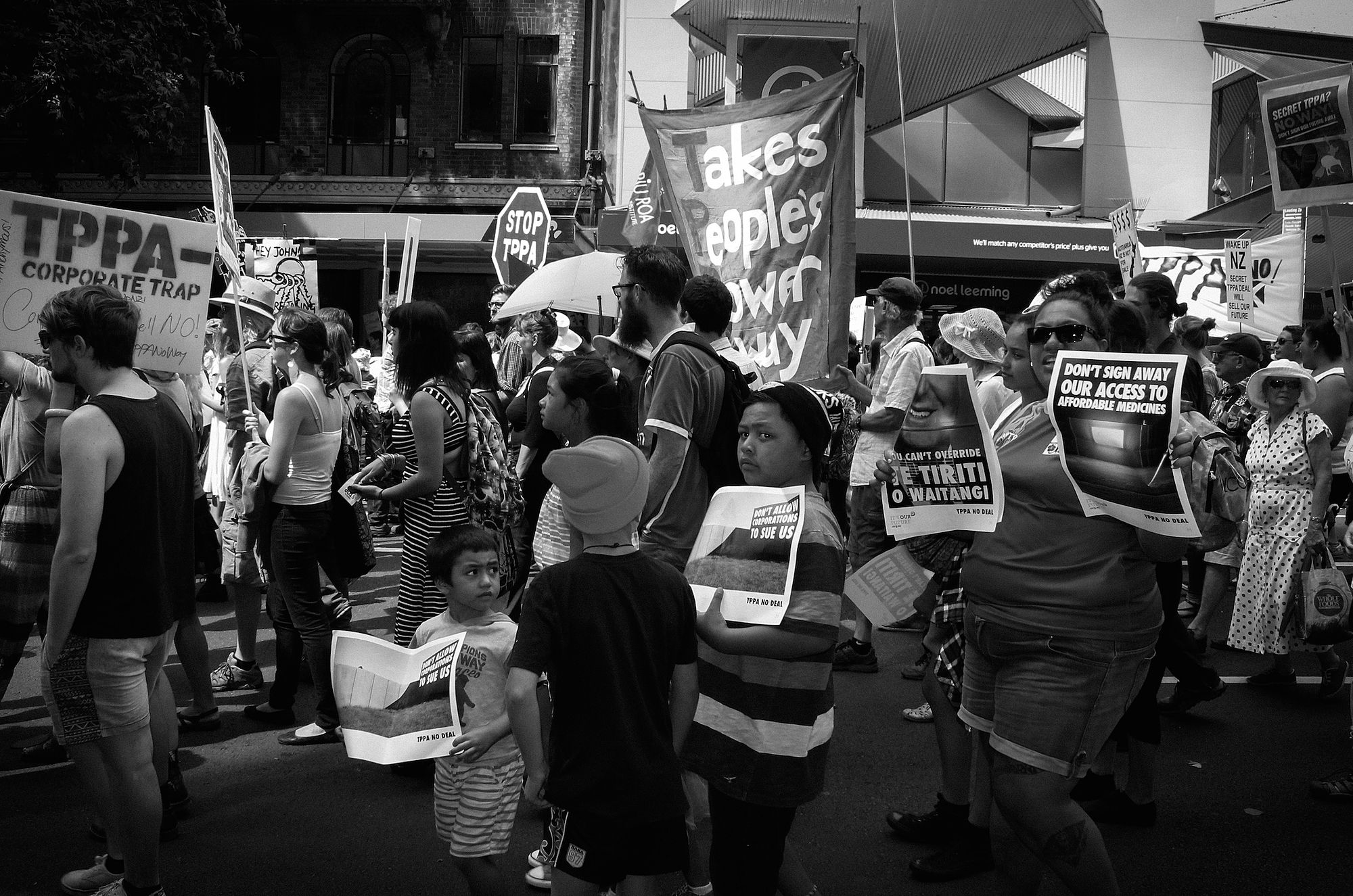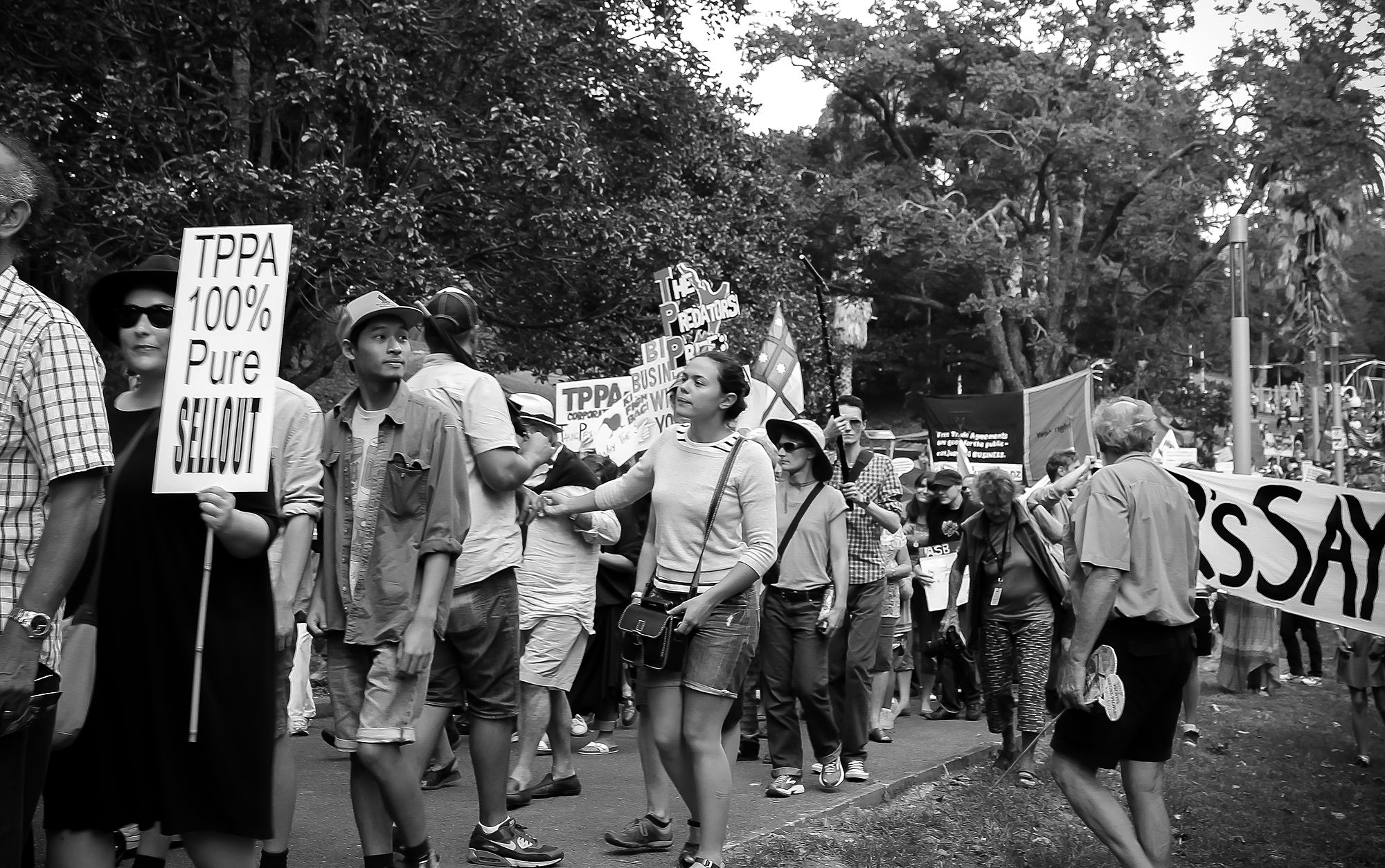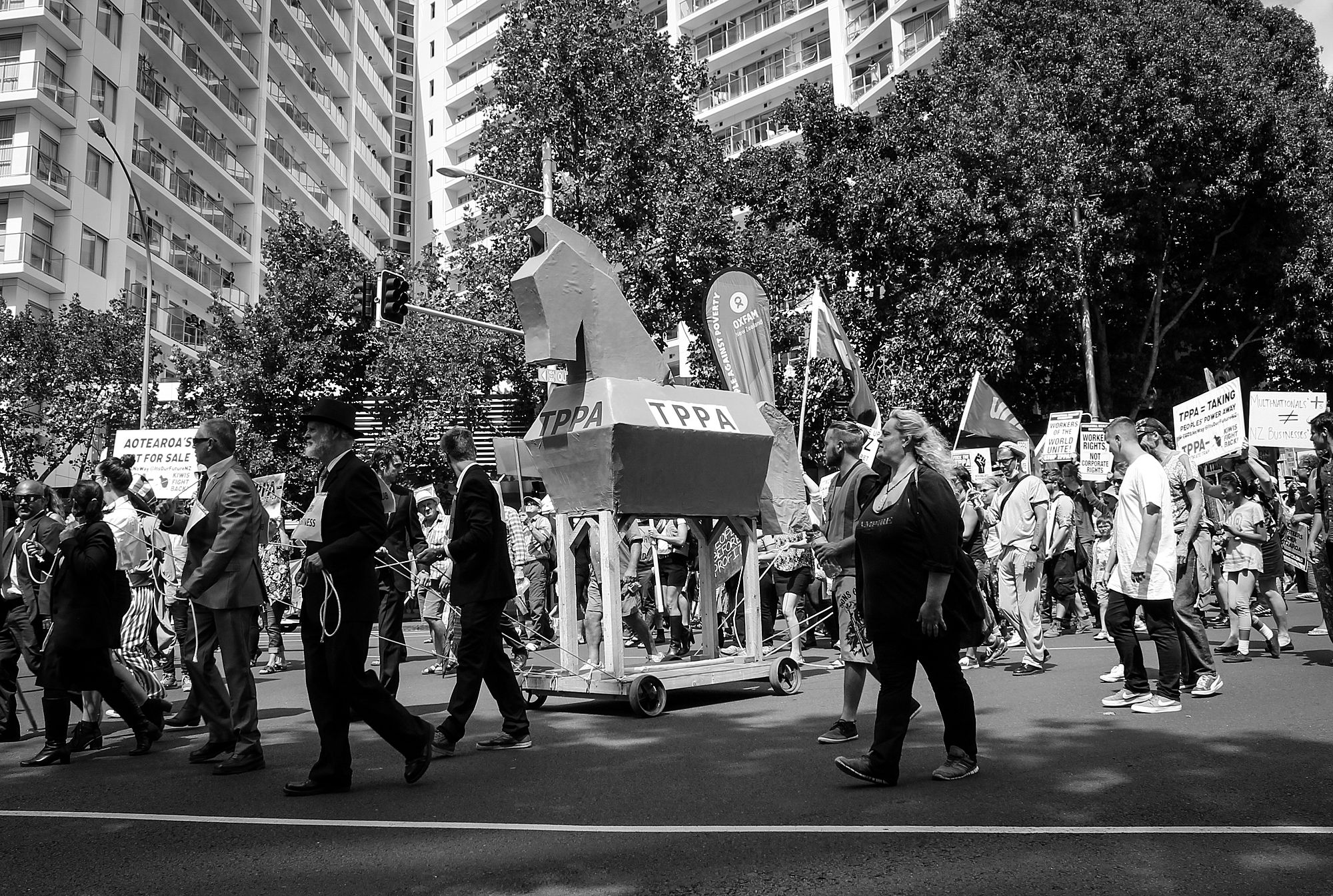Silent Majority, Silent Democracy
Rose Archer on the PM, Nixon and the TPPA
In March of this year, John Key described his actions in working to pass the Trans-Pacific Partnership Agreement (TPPA) as representing the 'silent majority' of New Zealanders. He made the comment in response to thousands of protesters in towns and cities all over New Zealand showing public opposition to the agreement – a lineup that included academics, public health professionals, families, workers, and extended well beyond the usual ‘rent-a-mob’ tags given to public gatherings in this country. Whether Key is personally aware of the term’s history or not is unclear – but for those in the know, invoking the silent majority has scary rhetorical implications.
Although the notion of a silent majority had been bandied about by politicians before, Richard Nixon was the first modern political leader to call open the silent majority to justify unpopular policy – in his case, defense of the US military's continued involvement in the Vietnam War.
To set the scene: by September 1969, only 35% of Americans backed Nixon's handling of the war, and 57% of Americans opposed it. On October 15, millions in the US and overseas marched in a moratorium against involvement in Vietnam - clergy, students, suburban parents. Faced with criticism over the mounting human cost on each side of the conflict, he went live on television and radio in November 1969 to profess that US military were acting on behalf of – and supported by - the 'great silent majority'. Continuing, he exhorted that majority to support his actions, distinguishing them from a minority who were demonstrating, marching and otherwise failing to accord 200-year-old institutions their due respect.
The concept wasn't a sudden burst of inspiration. It had been road-tested for years before - as the "forgotten American", or "the nonshouters". As Rick Perlstein describes in his book Nixonland, Nixon's VP Spiro Agnew had struck out earlier, insisting that "it is time for the preponderant majority, responsible citizens of this country, to assert their rights." They'd been cowed by decadent "political hustlers". It was then as it is now, a way to silence the voice of people who are fighting to have a say in the way that their country is run. In an instant poll taken shortly after Nixon's speech, the percentage supporting his handling of the war skyrocketed - as did his approval rating. So did the number of people who agreed that antiwar protesters were "harmful to public life".
Unlike Vietnam, the TPPA isn’t a theatre of war, but since negotiations began in 2005, it’s been treated with a similar amount of secrecy, and a good deal less scrutiny. Closed-door meetings and confidentiality have defined the talks from the outset.
According to the US government, the TPPA is designed to "enhance trade and investment among the TPP[A] partner countries, to promote innovation, economic growth and development, and to support the creation and retention of jobs."
Yet concerns have been raised by a multitude of groups and individuals in New Zealand and overseas – academics, health professionals, unions, and even businesspeople. If that sounds like a paradox – we don’t know what’s in it, but we don’t like what’s in it – it's been possible to piece together some of the agreement's most significant parts thanks to Wikileaks. Since late 2013, a number of draft portions of the TPPA’s chapters have been released through Wikileaks and other sources, providing a flavour of what the agreement could set in stone for intellectual property rights, environmental standards, and the kinds of powers granted to foreign investors.
The most controversial of the recent leaks was the TPPA’s healthcare chapter, which gives large pharmaceutical companies say in the regulatory and operational guidelines of Pharmac, and other agencies that decide which medicines and medical devices to subsidise with public money. Even before this recent leak, there was cause for concern about the extension of medical patient time periods for drugs granted in previously leaked draft documents. The logic of this provision is that pharmaceutical companies (some of the richest in the world) need incentive to invest in research and development - but the special extensions and exclusivity are widely accepted as being excessive.
In fact, a report this year by the Foundation for AIDS Research details how these sorts of protections would have inhibited progress to date in fighting HIV and curbed innovation, rather than incentivizing it. The irony is that this is all supposedly in the name of free trade, an elaborate system of protectionism afforded to pharmaceutical companies and creating a period of very profitable monopoly.
Another of the leaks from late in March 2015 was of the draft 'Investment Chapter', which includes provisions for the establishment of Investor-State Dispute Settlement (ISDS) tribunals which would bind signatory nations. These tribunals provide a mechanism by which companies can sue governments for passing laws that might reduce their profits. For the purposes of democratic lawmaking, ISDS is possibly the most damaging form of provision within modern Free Trade Agreements[i] - it’s under different agreements with similar powers that you see situations like that in Egypt, where the French company Veolia is presently suing the government for raising its minimum wage (under the TTIP). In fact, examining the history of Free Trade and Investment Agreements we see a surfeit of cases in which democratic, progressive and humanitarian law making has been undermined by ISDS tribunals.
Beyond relying on leaks, we can also speculate on the TPPA’s impact and content by looking at past Free Trade Agreements such as The North American Free Trade Agreement (NAFTA). Like the TPPA, NAFTA was negotiated in relative secrecy (although as one former advisor claims, NAFTA’s restrictions on who could actually see the agreement were relatively relaxed and flexible compared to the TPPA’s). It was pushed through Canada, Mexico, and the US’s lawmaking bodies on the argument that having a 'free trade zone' would strengthen the economy of the areas involved.
Within the dense and extensive history of NAFTA since 1994, many events highlight the dangers of Free Trade Agreements[ii]. Among others, in 1997, the Canadian government was sued by the Ethyl Corporation under investor-state provisions for banning the use of a chemical that they believed to be harmful to human health and the environment in gasoline (MMT, or methylcyclopentadienyl manganese tricarbonyl). The ban was overturned and the Ethyl corporation won $US13 million in damages, although there is still conflicting evidence as to whether the chemical is dangerous to humans.
And in Mexico, excess corn from heavily subsidized farms in the USA was dumped into their market. This led to a massive drop in the price of corn, and impoverished local corn farmers in Mexico (two million have had to leave their farms since NAFTA was introduced).
Meanwhile, in the USA huge numbers of manufacturing jobs were lost to Mexico after this legislation passed, damaging both middle-class and working-class livelihoods.
Proponents of free-market economics have a defense for each of these events. Findings about the harmfulness of MMT are inconclusive and therefore should not inhibit trade. Mexican farmers were already on a downwards-economic trend. And companies should be allowed to find the most competitive labour - by doing so, the 'trickle down effect' of higher employment by international companies can enrich developing countries.
Yet often, these arguments come from politicians or businesspeople whose ideological and financial investments are supported by investment legislation. Human beings have a bias to seek and create justification for whatever 'truth' is most comfortable for us to believe, even if this means minimising the human impact of the decisions that we make.
Worryingly, Public Citizen, a non-profit consumer rights advocacy group, claims that many of NAFTAs supporters in Congress – the people actually responsible for making this legislation into law in America – did not read the document, despite having better access than those today. Instead, they speculated on the likely benefits based on trade theory, or simply ideological prejudices towards some notion of “free trade”, irrespective of form or evidence.
You’d hope that given the opportunity to read it, our politicians would show more credulity – even in the National Party, there should be disquiet over the possibility a finished agreement would deny or endlessly defer greater international market access for our dairy exports. Yet in New Zealand, the TPPA gets tabled to parliament only when negotiations are concluded and it has been signed. Parliament then have 15 days to read the text (roughly the size of two telephone books, accounting for essential schedules and appendices) before the final vote passing it into law[iii]. It's a process in which University of Auckland academic and trade agreement expert, Professor Jane Kelsey, says elected representatives and citizens are "impotent to affect a process that the Cabinet effectively controls from start to finish.”
Of course, even with a full reading of the text, assessing the potential impact of NAFTA was purely speculative. And indeed, some of those speculations have been vindicated; exports for each three countries have grown, oil and food prices have dropped and agricultural exports for the USA in particular have grown. However, these arguments do not factor in the cost of NAFTA, and leave out the impact on many stakeholders in society. One might even say that it forgets the cost for the silent majority of citizens.
NAFTA, of course, was essentially pre-internet, and so it’s difficult today to conceive of what discussion, dissent and mobilization against it look like. But more recently, we saw another piece of international legislation passed with secretive negotiations - the Anti-Counterfeiting Trade Agreement (ACTA), eventually signed in 2011 by New Zealand, and eight other countries including the United States.
This legislation was passed with the intention of creating an international standard for copyright protection. However, the secrecy in which the negotiations took place was a recipe for policy laundering – a situation where every party could conceivably contribute clauses that their own constituencies would reject out of hand, and then plausibly deny having inserted them – a selection of unpopular legislation no one has to be fully accountable for.
In 2009 Stavros Lambrinidis (then the Vice-President of the European Parliament) stated that 'ACTA is legislation laundering on an international level of what would be very difficult to get through most Parliaments'. This policy laundering had serious consequences: Doctors Without Borders criticized ACTA for inhibiting access to affordable medicine, particularly for third world countries. It has also been criticized by a host of organizations, including InternetNZ, for endangering internet freedom and privacy rights. Concerted civil society and political action saw ACTA released by governments, and subsequently fail to clear the EU parliament - notably, the TPPA's leaks on intellectual property suggest of ACTA's most contentious and chilling provisions, including the liability of Internet Service Providers for copyright infringement.
The relative openess of ACTA may be a passing moment in time. Increasingly, we see that free trade and investment agreements present a history of leaders attempting to circumnavigate the democratic process and undermining governments’ legal authorities: very much as Obama is attempting to with the TPPA process last month, George H. W. Bush attempted to fast-track NAFTA into law. The legislation eventually passed a few years later under Clinton's guidance. Signing it off in September 1993, he affirmed that: "NAFTA means jobs. American jobs, and good-paying American jobs. If I didn't believe that, I wouldn't support this agreement".
In Mexico, in order to pass NAFTA the government amended Mexico's constitution by removing the protection of indigenous and communally-held agrarian lands from privatisation. In Canada, politicians on both sides ignored very clear anti-FTA voting trends across two general elections, the right signing NAFTA and the left quietly revoking its policy opposing it when it won office.
So does Key’s ‘silent majority’ statement have any substance? In my experience, many New Zealanders do not fully understand the TPPA, let alone support it. I went out and asked eight Aucklanders if they had heard of the TPPA, what they knew about it, and what they think about the government passing legislation without sharing its content with us. Of course vox pops are not the most scientific form of survey, but it’s no less scientific than the ‘silent majority’ claim – the authoritarian assertion that anyone who is silent would come forward, if pressed, in support of the government.
And indeed, in New Zealand’s largest city, that didn’t appear to be the case. Here are those conversations, and they reflect the general tone of thought that I have come across on this topic in Auckland previously:
Nixon’s form of wedge politics was cynical but effective. Against the odds of the pundits, he pulled off a resounding general election victory in 1972. Meanwhile, anti-Vietnam protesters would face three years of increasing jeers, confrontation and violence.
But perhaps the protesters had something that the politicians lacked – perspective. They could see clearly what was so clouded to those in charge; that all the death and destruction was in vain. For some, that fog of war has lifted since – later in life, former Secretary of Sefense Robert McNamara publicly condemned both his own and the US government's actions in the Vietnam War.
Writing in 1995, he acknowledged that those in power "misjudged then — and … have since — the geopolitical intentions of our adversaries … and … exaggerated the dangers to the United States of their actions". More bluntly, he outlined that "we did not fully explain what was happening, and why we were doing what we did."[iv] This lack of accountability at the time of the Vietnam War exacerbated the groupthink of those in power, and facilitated leaders to make misinformed decisions –the consequences of which continue to be devastating to this day.
Deals like these don’t have the same immediate impact of war, but they – and the attitudes of our elected officials when put on the spot about them - raise fundamental questions about the nature of democracy, and what we see as being our place in it. Do we think that it is enough to tick a form every 3 to 5 years and hand over all of the decision making to someone else? Or do we need to be actively involved in the decision making process? Obviously it's not practical for people to be consulted about every decision that is made – this is the whole reason that we have elected officials – but how do we strike a balance between efficiency and participation? And perhaps most importantly, if we accept that need for media – do we ever think that it is okay for leaders to deliberately withhold legislative changes from the public?
It is important for everyone to remember that our leaders are responsible for keeping this balance; they are the heralds of democracy. But locally and internationally our leaders are failing - reflected by historically low voter turnout in recent elections, both here and overseas. And as a politician, if you’re failing to inspire your people to take part in the process, then you’re failing the most important part of your job.
Of course, it is more complicated than simply pointing the finger at our leaders; the media has a responsibility to report on political issues in a way that is both comprehensive and engaging, and people have a responsibility to listen and get involved. But when leaders deliberately withhold information about massive legislative change, then assume the compliance of a 'silent majority', democracy cannot succeed. Here in New Zealand Key and his government hold that silent majority in contempt - they're not doing its bidding, but trading on its goodwill. They’re using an enforced ignorance, and it’s being done to pass legislation that is more likely to do harm than good to the majority of New Zealanders.
TPPA Demonstration photographs taken and edited by Edward Miller.



